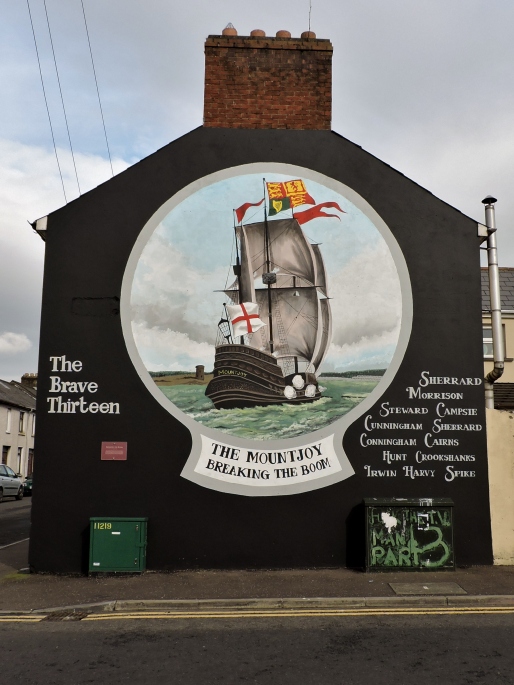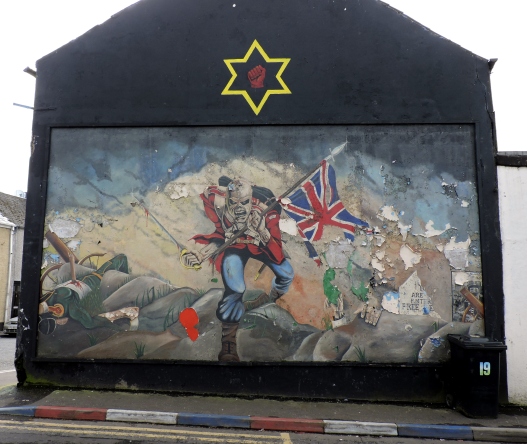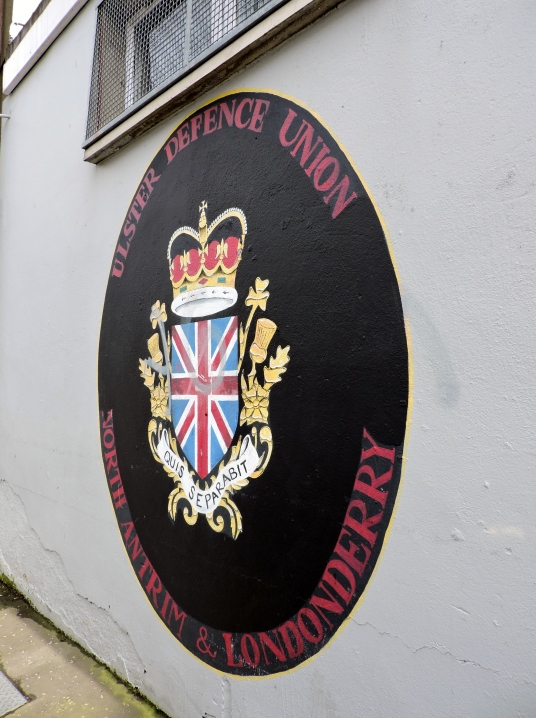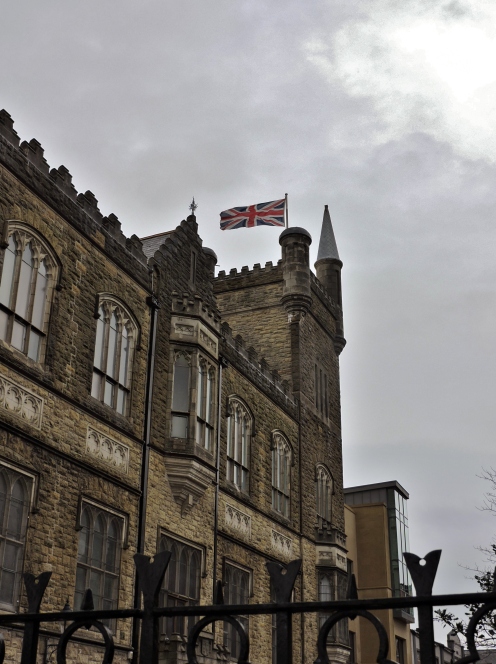My trip to Derry can’t be put into one post. There’s just too much to the city to compress it into one little tale and it is too special to me. It started when I bought a ticket to ‘Derry’ and the bus driver said he didn’t know where that was, but that he’d be happy to drive me to ‘Londonderry.’ This city is a complicated place, full of pride and controversy. Unlike it’s neighbors in the north, it has no towering, man-made “peace” walls, but it remains segregated and even its name is still hotly contested, as I learned that day. Its Loyalist population feels like its culture is under attack and being stripped away, just as they do in other parts of the region. This post is about their side of the river Foyle, in the town that many of them still call Londonderry.
(London) Derry seems almost quaint next to Belfast, but it is the second-largest city in the North of Ireland. Its foundation was built on religious division and segregation and its history is tragic and hard. The city’s stone walls were built in the early 1600s to protect the imported population from the native Irish who were being displaced and disenfranchised by the growing English town.
These new residents were universally of the Protestant faith, mostly of English or Scottish origin, and rabidly loyal to the Crown. The area soon became part of England’s massive Ulster Plantation, and the settlers enjoyed power and wealth while the native Irish population, who were mostly Catholic, watched their freedoms and potential for prosperity dwindle.
In 1689 the walls were tested when the Jacobite army surrounded the city. While they were approaching, thirteen apprentice boys grabbed the keys and locked the city gates. The siege of Derry lasted for months and nearly half the population died of starvation, injury, or disease, but clipped English cries of “No Surrender” were still heard on the walls. The siege was finally broken when a Royal Navy ship broke through the timber barrier on the river (the boom) and delivered food and reinforcements. The city remained English, Protestant, and proud.

For centuries the anti-Catholic sentiment continued to flourish in politics, laws, and deeds. Segregation was a fact of life and sectarian conflict became commonplace. There was no representation for the Catholic or Nationalist communities and bitter division was the norm. Even now the Apprentice Boys in Derry celebrate the defeat of the Catholic king with annual parades and ceremonial gate closures. For many years this strictly Protestant organization celebrated the victory of William of Orange by marching through the Catholic neighborhoods of the city instead of celebrating in their own, which always led to violence and chaos.
In 1969 the Civil Rights movement was going strong in Derry and tensions between Protestants and Catholics and Loyalists and Nationalists, were astronomically high. Many community leaders begged the city and the Apprentice Boys to reroute their march or cancel their parade altogether. Their requests were ignored and the parade resulted in three long days of intense rioting, looting, and destruction. Eventually the British Army had to come in and put an end to the conflict because the police couldn’t (or wouldn’t) control it and many had encouraged or joined in the sectarian fighting. It was the beginning of nearly forty years of tragedy and trouble. During that time eventually both sides were clobbered into compromise – the governments changed, laws changed, and the balance of power began to shift into more neutral territory. Changes were grudgingly made and after a long, hard road, there is a fragile peace in the city and the region. Not everyone is happy with those compromises though and that’s obvious on both sides of the river.

The disgruntled side is somewhat understandable. It must be hard to share when you’ve never had to before, especially when you’re forced to. If the majority of your culture is power-based, watching that power dwindle is awful, and the culture that celebrated it obviously feels threatened and cheated. This is why Loyalists from (London) Derry to Bangor all say the same things and feel the same way. It’s why membership in sectarian organizations and paramilitary groups is actually on the rise again and why some militant murals that are old and chipping away are being restored, while others pop up that are brand new. However, if you recognize that the power wasn’t rightfully yours anyway and that the world is just headed toward equality, rather than toward any side dominating the other, it begins to look like progress….to some. To others, it’s the same old slogans and the same old war.

This regression to the past is happening all over the North and Derry is no exception. While it has successfully curbed a lot of the violence that still flares up in other places, there is an underlying tone of preparedness in the city. Both sides of the river are ready for whatever happens next and each side will go at it alone, as they’ve always done before. They won’t ever unite, which is a tragic truth. Everyone is still ready for a fight if one should occur and there will be no surrender.
That being said, the city is gorgeous and well worth a visit. It may even capture your heart and it is no more dangerous than any other in the region. In fact, (London)Derry has been successful where many others haven’t. The relative calm of its parade season is downright refreshing these days, and the newer Peace Bridge links the two sides of the river for visitors and locals alike. It seems to be trying to connect its communities but years of trauma, distrust, and discrimination can be hard to get over. Everything seems incredibly fragile and touchy. The Union Jack was flying over the Apprentice Boys hall while I was there, surprising many of the locals who considered its unusual presence incredibly provocative. Derry still has a long way to go before everyone in it can relax or move away from all the hostilities of the past.

These days representatives from both communities talk up the decades of peace and celebrate the fact that most of the violence has faded. Many younger people have rejected the religious influences of the church(es) and are just trying to live their lives in peace while they can. Time marches on and as the past gets a little farther away, some are committing themselves to a shared future and Derry has made decent strides toward that goal. But just under the surface and off the main streets, you can see that the paramilitary organizations and sectarian groups are still around, they’re just a less blatant and a little quieter here than in other places…and everybody knows that you should watch out for the quiet ones. They can be extremely volatile. Tread softly here, for the wounds are not yet healed and the peace is carefully negotiated at every step..but not too softly, or you may miss how powerful and amazing this little city is.

Reblogged this on Bampots Utd.